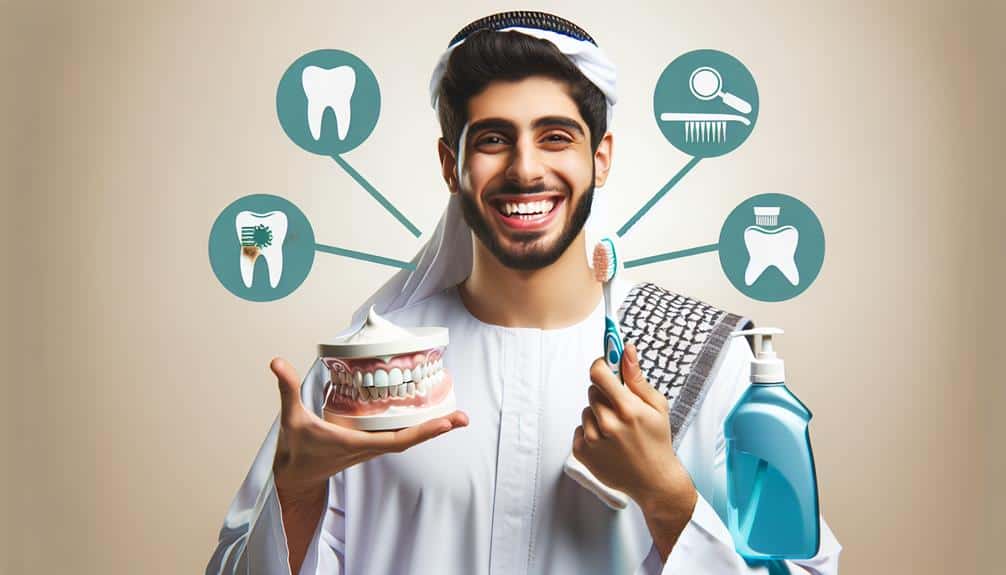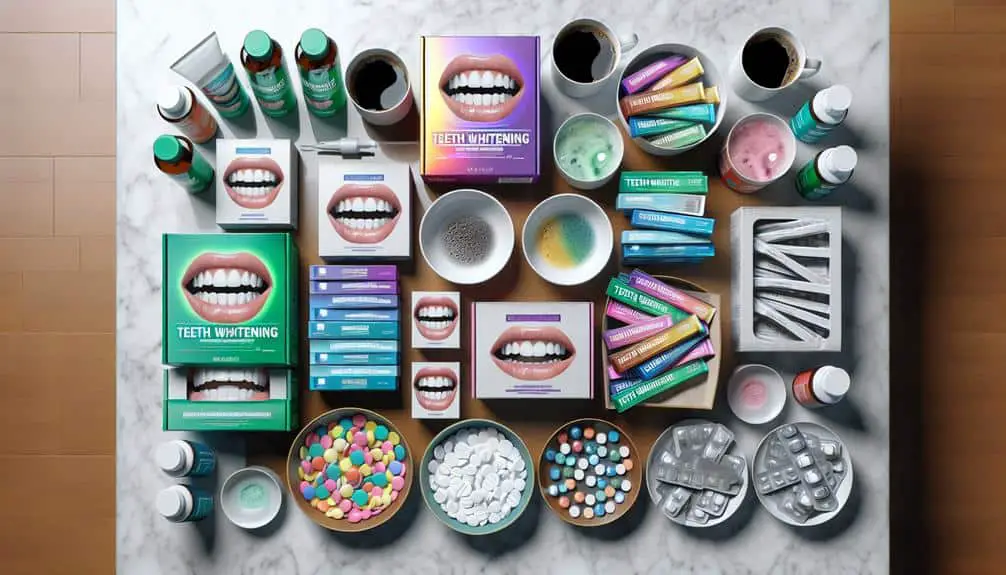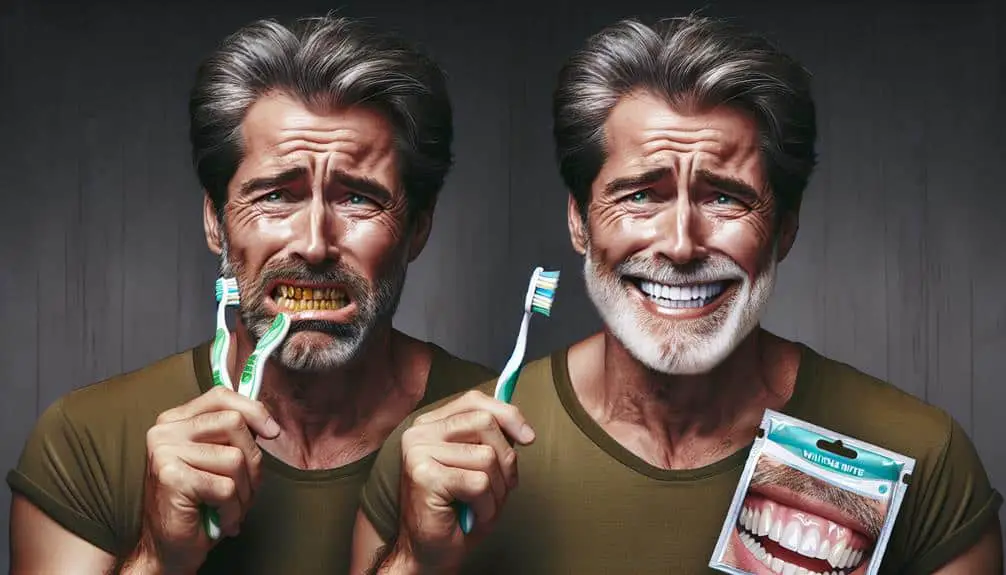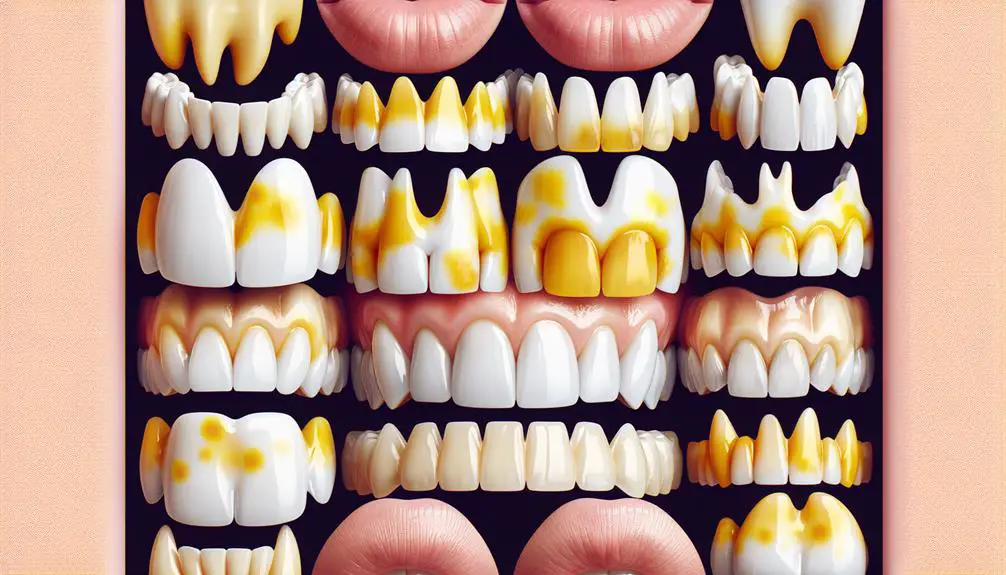If you're struggling with medication stains on your teeth, try using whitening toothpaste with gentle abrasives, hydrogen peroxide, or baking soda. These ingredients help remove stains effectively. Consider toothpaste with fluoride for enamel protection and choose based on your dental needs. DIY remedies like baking soda and hydrogen peroxide can also be effective. For stubborn stains, seek professional dental treatment. Remember to maintain good oral hygiene, limit stain-causing foods, and attend regular dental check-ups. Effective solutions are available to restore your smile and protect your enamel.
Key Points
- Use whitening toothpaste with gentle abrasives for stain removal.
- Consider DIY remedies like baking soda and hydrogen peroxide paste.
- Seek professional dental treatment for stubborn medication stains.
- Maintain good oral hygiene to prevent future medication stains.
- Limit consumption of stain-causing foods and drinks for better oral health.
Understanding Medication Stains on Teeth
If you notice discoloration on your teeth due to medication, understanding why these stains occur is essential for effective treatment.
Medication stains on teeth can be caused by a variety of factors. One common cause is the presence of chromophores in certain medications, which can bind to the enamel and result in discoloration. Additionally, some medications may have acidic properties that can erode the enamel, making it more susceptible to staining. Poor oral hygiene practices can also contribute to the development of medication stains, as plaque and tartar buildup can trap pigments from medications, leading to discoloration over time.
Prevention of medication stains on teeth involves maintaining good oral hygiene practices such as regular brushing and flossing to prevent plaque buildup. It's also recommended to drink plenty of water while taking medications to help wash away any pigments that could potentially stain the teeth.
If you're experiencing medication stains on your teeth, consult with your dentist for personalized advice on treatment options and preventive measures.
Benefits of Using Whitening Toothpaste
Using whitening toothpaste can help improve the brightness and overall appearance of your teeth. Whitening toothpaste works by gently polishing the teeth to remove surface stains. It contains abrasives or enzymes that aid in this process. Additionally, some whitening toothpaste brands incorporate peroxide or other chemicals that help to break down and remove stains deeper within the enamel.
Apart from enhancing the aesthetics of your smile, whitening toothpaste can contribute to improved enamel health. It aids in removing plaque and bacteria, which are detrimental to oral hygiene. By maintaining a clean and healthy mouth, you can prevent issues such as cavities and gum disease. Additionally, some whitening toothpaste products contain fluoride, which is essential for strengthening enamel and preventing decay.
Incorporating whitening toothpaste into your daily oral care routine can be a simple yet effective way to brighten your smile while promoting excellent oral health. Remember to choose a reputable brand and follow proper brushing techniques for the best results.
How Does Whitening Toothpaste Work?
To comprehend how whitening toothpaste works, it's important to grasp its mechanisms for removing stains and enhancing the appearance of your teeth. Whitening toothpaste typically contains abrasive particles that help scrub away surface stains caused by foods, beverages, and habits like smoking. Additionally, they often include chemicals like hydrogen peroxide or carbamide peroxide, which are bleaching agents that can penetrate the tooth enamel to break apart and remove deeper stains.
The chemical composition of whitening toothpaste plays a vital role in its effectiveness. These chemicals work by oxidizing stains, altering their chemical structure to make them appear less concentrated. By breaking down these stains, the toothpaste helps restore the natural color of your teeth.
Moreover, whitening toothpaste can also aid in stain prevention. Regular use of these toothpastes can help prevent new stains from forming on the teeth, maintaining a brighter smile over time. It's essential to select a whitening toothpaste that's approved by dental associations to guarantee its safety and efficacy.
Choosing the Right Whitening Toothpaste
Selecting the appropriate whitening toothpaste can greatly influence the efficiency of your oral care regimen and the overall look of your teeth. When choosing a whitening toothpaste, consider toothpaste options that contain gentle abrasives or polishing agents to help remove surface stains effectively. Look for ingredients like hydrogen peroxide, baking soda, or activated charcoal, known for their stain-removing properties.
Additionally, it's essential to prioritize enamel protection when selecting a whitening toothpaste. Opt for toothpaste that's gentle on your enamel to prevent damage while still effectively whitening your teeth. Fluoride is a key ingredient to look for, as it helps strengthen enamel and prevent decay.
Before purchasing a whitening toothpaste, consider your specific needs and any sensitivities you may have. Some toothpaste options are specially formulated for sensitive teeth, offering whitening benefits without causing discomfort. By choosing the right whitening toothpaste that suits your requirements, you can maintain a healthy, bright smile while safeguarding your enamel.
Tips for Effective Stain Removal
For ideal stain removal on teeth, prioritize toothpaste with mild abrasives and enamel-friendly ingredients. When tackling medication stains, consider these tips for effective stain removal:
- DIY Remedies: Utilize homemade solutions like baking soda and hydrogen peroxide paste to gently scrub away surface stains caused by medications. These DIY remedies can be a cost-effective way to maintain your oral health.
- Professional Treatment: Seek assistance from a dentist for deeper, more stubborn stains. Professional treatments such as teeth whitening procedures or dental cleanings can effectively remove medication stains that are resistant to over-the-counter solutions.
- Preventive Measures for Long-Term Solutions: To prevent future medication stains, maintain good oral hygiene practices, limit stain-causing foods and drinks, and attend regular dental check-ups. Long-term solutions involve consistent care and preventive measures to keep your teeth free from medication-induced discoloration.
Frequently Asked Questions
Can Medication Stains on Teeth Be Prevented With Proper Oral Hygiene Practices?
To prevent medication stains on your teeth, prioritize oral hygiene habits daily. Brush and floss diligently, and consider lifestyle changes like reducing sugary foods. Good oral care can help keep those stains at bay.
Are There Any Specific Medications That Are More Likely to Cause Stains on Teeth?
Certain medication types, like tetracycline antibiotics or antipsychotics, can lead to tooth staining. Drugs causing tooth discoloration vary, so consult your healthcare provider for alternatives if concerned. Regular dental check-ups can help manage any issues.
Can Professional Teeth Whitening Treatments Help Remove Medication Stains on Teeth?
Professional whitening treatments can effectively remove medication stains on teeth. Cosmetic dentistry offers various options for enhancing your smile. Consult a dentist for personalized advice on the best approach to achieve desired results.
Are There Any Natural Remedies or Home Remedies That Can Help Remove Medication Stains on Teeth?
When it comes to medication stains on teeth, exploring natural remedies can be beneficial. DIY solutions like baking soda and hydrogen peroxide mix or herbal treatments like turmeric paste may help in gently removing stains at home.
How Long Does It Typically Take for Whitening Toothpaste to Show Noticeable Results in Removing Medication Stains on Teeth?
For most people, whitening toothpaste can take 2-6 weeks to visibly reduce medicine stains on teeth. Consistent use is key for best results. Remember, individual outcomes may vary based on the severity of staining.



